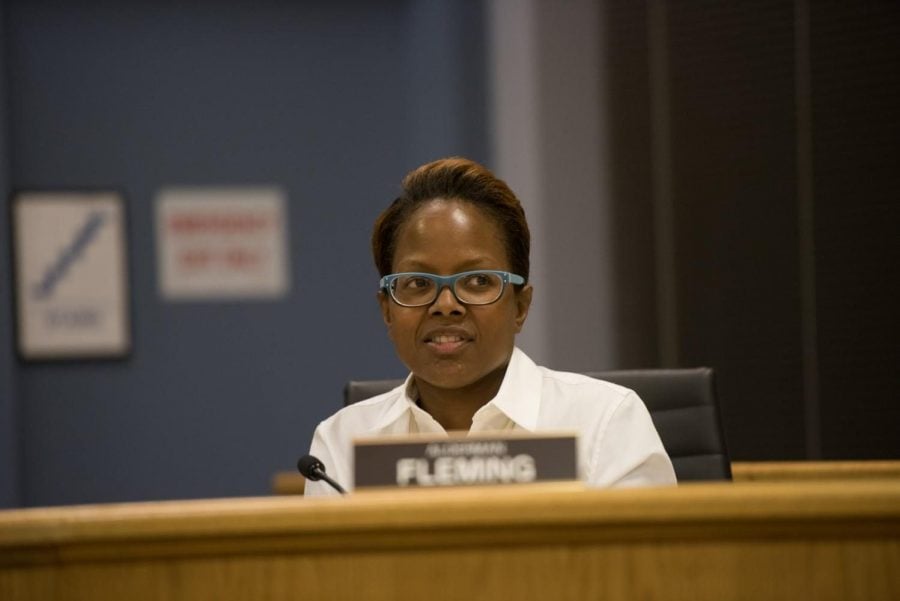Human Services Committee reviews police services and response models in hopes of moving towards defunding
Daily file photo by Katie Pach
Ald. Cicely Fleming (9th). Fleming expressed an interest in moving forward with reallocating police funding in order to show commitment to the community’s interests.
August 4, 2020
Evanston’s Human Services Committee reviewed and discussed police services and response models on Monday.
The discussion came in light of residents’ recent calls to defund the police and reallocate funds to human services programs.
At the meeting, Police Chief Demitrous Cook said the police work for the people, and if defunding the police is what the community wants, then he is open to the idea.
“Public dollars are sacred… what we do in a police department should be creating public value for the money that is spent,” Cook said. “If we can do that in a more efficient way with the help of partnerships from other agencies, I like that, and I’m not ashamed to say that every leader and public service for the police or fire or any other part of government should have the same perspective.”
Ald. Eleanor Revelle (7th) said that after listening to members of the community and researching what other cities around the country have done in response to similar concerns, she discovered the alternative emergency response service model. She said many cities found the majority of their 911 calls were related to non-criminal, non-violent situations, such as mental illness, homelessness, substance abuse or intoxication.
The alternative emergency response service model calls for a two-person team with a mental health professional and someone with a medical background, Revelle said.
“It seems to me that this kind of model gets the right people to the scene to provide the kinds of services and support that the particular individual needs in that case,” Revelle said. “I’m really hoping that we can consider whether such a model would be the right model for Evanston.”
About 65 percent of Evanston Police Department’s officers have received critical incident training, which Deputy Police Chief Jody Wright said helps them deal with people who are in crisis. However, Wright also said the training comes in handy in everyday interactions with the public.
Ald. Judy Fiske (1st) expressed her appreciation for such training, but also asked Wright for his opinion on including a mental health provider outside of EPD to respond with or in place of the police.
“I’m trying to figure out how we can make this work better and how we can address maybe some of the problems that the police department may have with folks appearing back on the street the next day and follow up with people who might have serious mental health issues that we need to better evaluate and treat,” Fiske said.
Wright said most social workers call the police when first interacting with a client due to uncertainty of how a situation may turn out.
“I’m not saying that this model that we’re looking at wouldn’t work. I think, you know, it’s hit or miss,” Wright said. “You don’t know when you send a social worker to a scene without a police escort if it’s going to turn violent within a snap of a finger.”
Committee members also discussed developing a resolution of commitment to defunding, since most of City Council and the community are in support of it.
Revelle said there has been confusion in the community about what the word “defund” means, and would like to continue the conversation a little longer before articulating a resolution. But Ald. Cicely Fleming (9th) pushed for the committee to move forward.
“I want to make sure… that we can get that done in this budget year and we can get that done without violating a union contract,” Fleming said. “I want to make sure we have time for all that to transpire so by the time we approve a new budget in November… we make that practical commitment to our community.”
Email: juliarichardson2023@u.northwestern.edu
Twitter: @juliaa_grace
Related Stories:
— With slight majority, Evanston City Council could move toward defunding
— Defunding 101: What does it mean to ‘defund the police’ and why is it gaining traction?
— Residents stage ‘sit-ins’ for defunding at virtual council meeting



